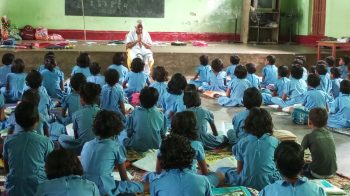By Tessy Jacob
Bhubaneswar, Sept 4, 2023: We attribute many qualities to a teacher – guru, motivator, second parent, visible gods, and guide.
Teaching is the most rewarding job that helps one walk with students over the years and see them grow up as useful citizens. Society acknowledges the profession with awards and the observation of the ‘Teacher’s Day.’
Not all deserving teachers get awards. Most would say their award is what their pupils make in their life.
I cannot let this Teachers Day pass without telling the story of an excellent teacher who educated generations of tribal people in a remote party of India. She is Holy Spirit Sister Kanthi Kullu, a retired school headmistress who dedicated most her life in educating the poorest of the poor.
Sister Kullu is among the first to join the Holy Spirit Sisters from Odisha, an eastern Indian state. The member of the Kharia tribe has an interesting story of her vocation.
She was privileged to be handpicked by one of the early foreign missionaries of Odisha’s Chotanagpur region that changed her life. Way back in the 1950s, education was a distant reality for a tribal child, leave alone a girl. Residential schools were a remote option for those few who could afford it.
The young Kanthi dared the odds, walked miles daily through thick forests and valleys and completed her upper primary school. Further study was delayed because of her family’s economic condition. She took to grazing cattle to support her parents for a few years.
She saw a ray of hope, when a German priest who came for Mass in her village, decided to help Kanthi to pursue further studies.
She completed BA and B Ed, and worked as a teacher for a few years in a mission school. God had a different plan for her, and in 1973, when the Holy Spirit Sisters opened their first convent in Odisha, she joined the congregation. She calls it as “a missionary helps the other one to be a missionary”
A few years later, when some of her students joined the same congregation, they were surprised to see their “Didi” (as teachers are generally called in Odisha) there. She was an NSS cadet and a strict disciplinarian in the school.
As an experienced teacher, in 1984, she was appointed to a school managed by the Sambalpur diocese. The school area was surrounded by forest, with tribal hamlets scattered around. Although the land was known for its scenic beauty and serenity, it lacked basic facilities. She joined the school as a teacher and went on to become its headmistress.
The school was a kacha building, and most classes were conducted under trees. Since it was in the middle of the forest, venomous snakes, bucks, insects were on the prowl. Evenings, Sister Kullu would sit with the students with kerosene lantern.
The school also had a hostel for tribal children from faraway places.
It took another decade to get electric connection, often unstable and low voltage. The students were least interested in studies because of their socioeconomic and cultural conditions. They loved roaming in the forest, collecting its produces. Sister Kullu had to work hard to keep them inside the school premises and instil love for studies.
The distance between the convent and school was less than one kilometer. She used a cycle to commute so that no time was wasted. On the way to school, she would yell at the students to go to the class. Since the school had shortage of teachers and office assistants, Sister Kullu had to take extra classes and do the clerical work.
To buy stationery for school, visit an office or get basic amenities for school and medical help they had to go to the nearest town, which was 15 km away through a road through the middle of the forest. No public transport was available. Often, they got stranded because of wild animals, or floods in a river on the way.

She returned to the place after a few years and now takes tuition for children. She has retired from her profession, but the teacher in her never retires.
She worked really hard through all the primitive facilities. She never walked, but moved at lightning speed. She had a commanding voice, and held a stick in her hands to protect her from wild animals and pull students out from their hiding.
No award has come her way. Nor was she able to put her school in the top list. However, she sustained the school steadily since she believed that education would change future generations. Years later, the same school grabbed many prizes, and most winners were children of Sister Kullu’s former students.
Her biggest award is the education she provided to tribal children in a backward region of India during her 25 years of teaching career. The unsung hero carries forward her duty even today.
While those she educated have gone all over the world, their ‘Didi’ still sits under a tree, teaching with a small stick in hand, and a loud but fading voice.









